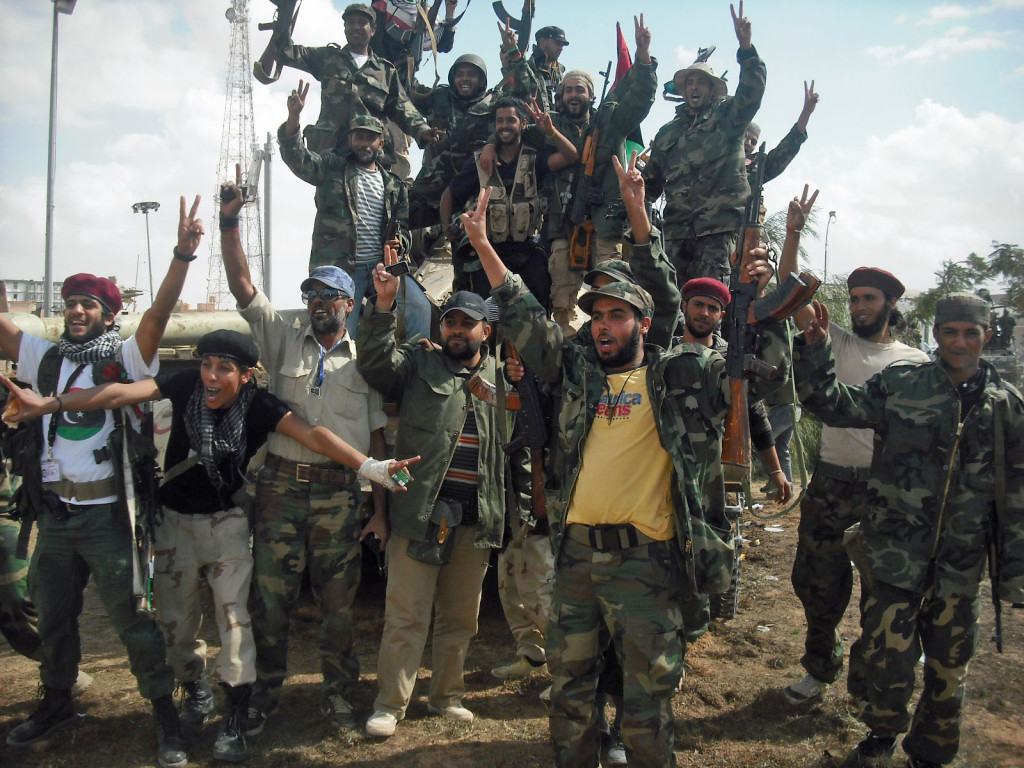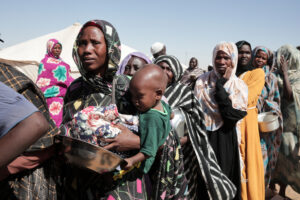Libya: The Islamic State’s Pivot Point

Fighters for Libya's interim government rejoice after winning control of the Kadhafi stronghold of Bani Walid. Picture by Magharebia | Flickr

[This was originally published here]
Thanks to Allah who kept us alive to see the dawn of the Caliphate state reemerge… And Allah’s blessing upon Libya that He bestowed upon us, young mujahideen men who answered the call of truth… and pledged allegiance to… Abu Bakr Al-Baghdadi… and [thus]the blessed expansion of the Caliphate into Libya was announced.
This excerpt comes from a letter titled “Libya: The Strategic Gateway For The Islamic State [IS],” published by IS supporter, Abu Irhim Al-Libi. Reiterating the strategic importance of the location—500 miles from Europe and the crossroads of 6 North African States—Al-Libi designates Libya as a gateway to launch attacks on Europe. However, while many are looking towards Europe with concern, there is something a bit more eerie about the strategy of IS in Libya: the view into Africa.
The Existing Problem
Post-colonial networks of interconnected cities, oases, and salt mines that reach from Awjill and Timbuktu across the bare Sahara into Tripoli and Cairo have long served as crossroads of trade and migration.
“Recently,” Fredrick Cooper, professor of African History at New York University, told World Policy Journal, these networks have “adapted to more recent possibilities of trade, legal and otherwise, including arms and drugs.”
Illegal goods move through these channels, generating unthinkable sums of money. UNODC estimates that $1.25 billion dollars worth of cocaine crosses the Sahara annually; weapon sales total $2 billion; cigarettes $1.5 billion; and hashish, oil, cars, and the wildlife trade are valued at hundreds of billions more. There is no short supply of criminal networks, prospective cash, or acquirable weapons in this region—making conflict inherent.
Though criminal networks are the main actors, terrorist organizations have began to penetrate the networks. Mali’s government reported that Al Qaeda in the Islamic Maghreb (AQIM) supported and ushered protection for trafficking networks, tradecraft inherited from Latin American cartels. Captured AQIM members acknowledged that they were transporting cocaine from Mali to Spain via North Africa, which is concerning both for Europe and the United States.
Trafficking supports criminal groups and serves as a destabilizer in the region. IS’s proximity to such trafficking means these markets have “potential to be exploited,” says Dr. Cooper.
The experience and ability of IS to operate within similar frameworks is frightening. An American congressional report asserted, “The movement of illegal drugs through West Africa has security implications for the United States, including the financing of terrorist organizations like AQIM, Hezbollah, and the FARC. At the same time it destabilizes the countries and corrupts governments throughout the region.”
IS should be added to that list, as their encroachment into these funding circles seems imminent. The million-dollar question is whether or not IS possesses the intent and capabilities to do so.
They’ve Done It Before, They Can Do It Again
IS has vast experience operating within economic grey areas. Their campaigns in Iraq and Syria are largely funded through exploitation of trade and criminal networks. Illegal oil and antiques revenue, extortion, protection taxes, kidnappings, and drug trafficking all serve as major sources of funding.
Revenue generated by illegal oil is estimated at $2-3 million a day, and the antiques trade fetches hundreds of millions of dollars. Both of these income sources require elaborate trafficking schemes to transfer, sell, and acquire the proceeds. Historical pretense, existing Islamist presence, failing states, ethnic and religious tensions, and access to large financial networks make Africa a prime arena for expansion. IS will have no problem financing their operations close to home, as with territory comes wealth.
Speaking with World Policy Journal, President of the Arkin Group and former CIA official, Jack Devine, suggests that IS “consolidates financial control over areas they acquire, so it is not unlikely that the group could and would incorporate extortion, protection payments and percentage payments on goods.”
“This could include narcotics if/when IS expands its footprints to Africa,” Devine continues.
The U.S. Treasury Department fights to curb funding for IS by targeting those who trade with the group and individual members. Nevertheless, efforts to adapt to new challenges posed by IS are cumbersome. Penetrating markets in Africa would circumvent the initiatives of the department as the focus is on Syria, Iraq, and the surrounding region.
Long strife with violence, unstable and corrupt governments, and ethnic and religious competition, introduction of another well capable violent group into this region may be a tipping point. IS presence must be dealt with proactively before it can penetrate West and Central Africa.
Sarah Chayes, senior associate at the Carnegie Endowment for International Peace, suggests that social corruption is a key mechanism for most of the violence in the world today.
In 2007 the Justice Department issued a complaint in regards to an undercover operation in Liberia wherein a group of individuals conspired to traffic cocaine into the United States. “Drug trafficking organizations based in South America have increasingly used countries along or near the West African coast as trans-shipment hubs… In so doing, representatives of these drug trafficking organizations have often sought to bribe high-level public officials with large cash payments and narcotics in order to ensure the safe passage.”
In continuity, not only does corruption facilitate emergence and operation of these groups, but it will also increase with IS penetration.
With increased efforts be governments to increase jurisprudence and anti-corruption campaigns, these drug collectives may turn to IS for support once they gain influence.
Dealing with corruption is a step in the first direction, but is just the tip of the iceberg. The future of fighting terrorism lies in cooperation to dismantle the trafficking networks throughout Africa, and is not just Washington’s problem. An African “security belt” stretching from Mauritania to Sudan needs to be fastened to promote cooperation in battling these networks. Action will also have to stretch across the Atlantic to South America, from where the drugs originate; include increased border security, policing, and trafficking crackdown by African belt countries; and state growth towards stability in Algeria and Libya.
The Wild Card
Al Qaeda affiliated groups, keen on maintaining their financial networks, are rampant in West and North Africa. What will be their perception on IS encroachment? Will AQ affiliates strengthen when challenged, or will they pledge bayat to IS like Boko Haram has done? The answer remains key to understanding subsequent events in the region. However optimistic one may be, mechanisms that may lead to increased conflict and encroachment are as prevalent as ever in the region—but the world is looking out towards Europe rather than looking into Africa.
Jordan Clifford is a graduate student at NYU pursuing an MA in International Relations. Jordan’s work focuses on MENA security and culture. He works at International Politics Review, World Policy Institute, and the Center for Behavioral Research at NYU Stern.




